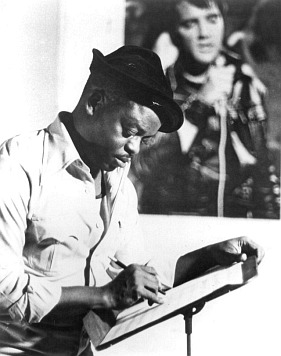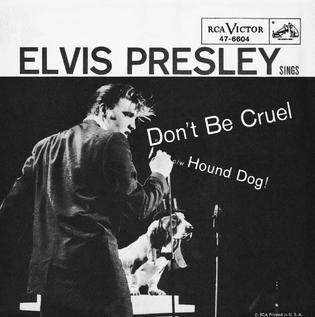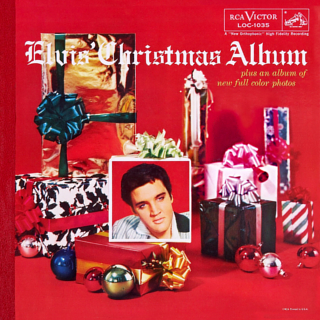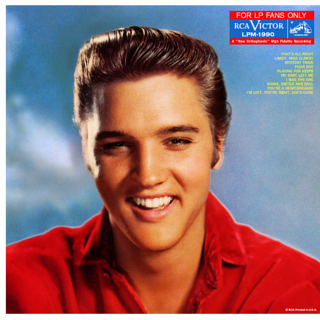
The Four Seasons is an American rock and roll and doo-wop band formed in 1960 in Newark, New Jersey. Since 1970, they have also been known at times as Frankie Valli and the Four Seasons. The band evolved out of a previous band called The Four Lovers, with Frankie Valli as the lead singer, Bob Gaudio on keyboards and tenor vocals, Tommy DeVito on lead guitar and baritone vocals, and Nick Massi on bass guitar and bass vocals. On nearly all of their 1960s hits, they were credited as The 4 Seasons.

Francesco Stephen Castelluccio, better known by his stage name Frankie Valli, is an American singer, known as the frontman of the Four Seasons beginning in 1960. He is known for his unusually powerful lead falsetto voice.

Otis Blackwell was an American songwriter whose work influenced rock and roll. His compositions include "Fever", "Great Balls of Fire" and "Breathless", "Don't Be Cruel", "All Shook Up" and "Return to Sender", and "Handy Man".

The Fontane Sisters were a trio from New Milford, New Jersey.

"Don't Be Cruel" is a song that was recorded by Elvis Presley and written by Otis Blackwell in 1956. It was inducted into the Grammy Hall of Fame in 2002. In 2004, it was listed #197 in Rolling Stone's list of 500 Greatest Songs of All Time. The song is currently ranked as the 173rd greatest song of all time, as well as the sixth best song of 1956, by Acclaimed Music.

Love Letters from Elvis is the 14th studio album by American singer and musician Elvis Presley, released in 1971. The album was critically panned upon release, and failed to crack the top 20 of the Billboard album charts but did reach No. 12 on the US Top Country Albums chart and No. 7 on the UK best-selling albums chart.
Gaetano "Tommy" DeVito was an American musician and singer, best known as a founding member, vocalist, and lead guitarist of rock band the Four Seasons.

"Million Dollar Quartet" is a recording of an impromptu jam session involving Elvis Presley, Jerry Lee Lewis, Carl Perkins, and Johnny Cash made on December 4, 1956, at the Sun Record Studios in Memphis, Tennessee. An article about the session was published in the Memphis Press-Scimitar under the title "Million Dollar Quartet". The recording was first released in Europe in 1981 as The Million Dollar Quartet with 17 tracks. A few years later more tracks were discovered and released as The Complete Million Dollar Session. In 1990, the recordings were released in the United States as Elvis Presley: The Million Dollar Quartet. This session is considered a seminal moment in rock and roll.

Elvis is the second studio album by American rock and roll singer Elvis Presley, released by RCA Victor on October 19, 1956 in mono. Recording sessions took place on September 1, September 2, and September 3 at Radio Recorders in Hollywood, with one track left over from the sessions for Presley's debut album at the RCA Victor recording studios on January 30 in New York. It spent four weeks at #1 on the Billboard Top Pop Albums chart that year, making Presley the first recording artist to have both albums go straight to number one in the same year. It would go on to spend 5 weeks at #1 in total. It was certified Gold on February 17, 1960, and Platinum on August 10, 2011, by the Recording Industry Association of America.

Elvis' Christmas Album is the third studio album and first Christmas album by American singer and musician Elvis Presley on RCA Victor, LOC -1035, a deluxe limited edition, released October 15, 1957, and recorded at Radio Recorders in Hollywood. It has been reissued in numerous different formats since its first release. It spent four weeks at No. 1 on the Billboard Top Pop Albums chart, and was the first of two Christmas-themed albums Presley would record, the other being Elvis Sings the Wonderful World of Christmas, released in 1971. The publication Music Vendor listed Elvis' Christmas Album on their singles charts for two weeks in December 1957 – January 1958, with a peak position of No. 49.

Elvis Is Back! is the fourth studio album by American rock and roll singer Elvis Presley, released on April 8, 1960 by RCA Victor. It was Presley's first album released in stereo. Recorded over two sessions in March and April, the album marked Presley's return to recording after his discharge from the U.S. Army. It was Presley's first album of new material since Elvis' Christmas Album was issued in 1957.

Elvis' Golden Records is a compilation album by American rock and roll singer Elvis Presley, issued by RCA Victor in March 1958. It compiled his hit singles released in 1956 and 1957, and is widely believed to be the first greatest hits album in rock and roll history. It is the first of five RCA Victor Elvis' Golden/Gold Records compilations, the first four of which were issued during Presley's lifetime. The album peaked at number three on the Billboard Top Pop Albums chart and was certified 6× platinum on August 17, 1999, by the Recording Industry Association of America.

For LP Fans Only is a compilation album by American singer and musician Elvis Presley, released on February 6, 1959 by RCA Victor. It compiled previously released material from an August 1956 recording session at 20th Century Fox Stage One, a September 1956 session at Radio Recorders in Hollywood, sessions on January 10 and 11 at the RCA Victor Studios in Nashville, two more at the RCA Victor Studios in New York, and multiple sessions at Sun Studio. The album reached number 19 on the Billboard Top Pop Albums chart.
The Four Lovers was a band formed in 1956 that was the result of vocalist Frankie Valli joining The Variatones in 1954. The Four Lovers achieved minor success before a name change to The Four Seasons in 1960. During those five years, group members also included Nicolas DeVito, Hugh Garrity, Charles Calello (bass), Nick Massi, Bob Gaudio, and Philip Mongiovi (drums).
The Wonder Who? was a nom de disque of The Four Seasons for four single records released from 1965 to 1967. It was one of a handful of "names" used by the group at that time, including Frankie Valli and The Valli Boys. Wonder Who? recordings generally feature the falsetto singing by Valli, but with a softer falsetto than on "typical" Four Seasons recordings.

Elvis' Gold Records Volume 4 is a greatest hits album by American rock and roll singer Elvis Presley, issued by RCA Victor in mono and stereo, LPM/LSP 3921, in January 1968, with recording sessions taking place over an eight-year span at RCA Studio B in Nashville, Tennessee, and at RCA Studios and Radio Recorders in Hollywood. It is a compilation of hit singles released between 1961 and 1967, peaking at number 33 on the Billboard 200. It was certified Gold on March 27, 1992, by the Recording Industry Association of America.

The King of Rock 'n' Roll: The Complete 50's Masters is a five-disc box set compilation of the complete known studio master recordings by American singer and musician Elvis Presley during the decade of the 1950s. Issued in 1992 by RCA Records, catalog number 66050-2, it was soon followed by similar box sets covering Presley's musical output in the 1960s and 1970s. This set's initial long-box release included a set of collectible stamps duplicating the record jackets from every Presley LP on RCA Victor, every single that had a picture sleeve, and most of his EP releases. The set includes a booklet with an extensive session list and discography, and a lengthy essay by Peter Guralnick. It peaked at #159 on the album chart and was certified a gold record on August 7, 1992, by the RIAA. Further certifications were for platinum on November 20, 1992, and for double platinum on July 30, 2002.

"Paralyzed" is a 1956 song recorded by Elvis Presley for his album Elvis. The song was recorded on September 1, 1956, and has been well received by music critics. The song was written by Otis Blackwell, with Elvis receiving partial song-writing credit.

"We're Gonna Move" is a song by Elvis Presley. The song is credited to Elvis Presley and Vera Matson, the wife of Ken Darby, the principal writer, published by Elvis Presley Music. The song was featured in the 20th Century Fox movie Love Me Tender and was released as an RCA Victor EP in 1956.














